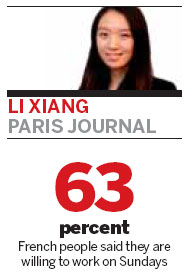

Belleville, on Sundays, is a study in contrast. The Paris neighborhood is populated mostly by Chinese immigrants from Wenzhou, a coastal city known for its entrepreneurial spirit.
Most Paris neighborhoods on Sundays are quiet. But Belleville's "rues" and boulevards are bustling. Shops, bars and restaurants are packed. And finding a parking space can be an exercise in managing frustration.
Chinese immigrants seem just too busy to care about another debate in the French media over the 35-hour workweek and the Sunday trading ban.
Why bother? Working on Sundays does not seem to be a problem for Chinese immigrants who are more than happy to make extra money whenever there is an opportunity.
They have seen their businesses flourish by navigating France's rigid and complex labor laws, which exempt some businesses from the Sunday trading ban.
Although the French authorities seem to have given Chinese business owners in Belleville a tacit "oui", most French retailers and stores except those in tourist areas are still strictly forbidden from opening on Sundays and after 9 pm on weekdays.
But now some French stores are starting to rebel against the century-old law portrayed by proponents as a cherished French tradition of equality and a symbol of the country's quality of life despite the fact that they may face a fine of 60,000 euros ($82,500).
Two French home-improvement chain stores, Castorama and Leroy Merlin, have just won the right to remain open on Sundays. Many consider it a landmark ruling, which could set a precedent.
Public opinion is also turning toward the idea of working on Sunday as 63 percent of French citizens said they are willing to work on Sundays, while 80 percent of respondents think that the government should let businesses open on Sundays as long as it is on a voluntary basis, according to a survey by French newspaper Le Figaro.
At a time of prolonged economic stagnation and high unemployment, the argument for maintaining the French quality of life is becoming increasingly untenable. Unemployment in France hit a record high in September with 3.29 million registered jobseekers.

Forcing businesses to close on Sundays would only make matters worse as it would mean that owners might be forced to lay off employees. It is obvious that the Sunday trading ban results in slashed profits for business owners, workers facing the risk of losing jobs, and inconveniences for consumers.
The retail sector currently employs roughly 1.7 million people and it is one of the few sectors doing relatively well.
I have seen many Chinese tourists disappointed to find their favorite Galeries Lafayette and Printemps department stores are closed on Sunday.
Perhaps the challenge of overturning a long-standing trading rule lies in altering a deep-rooted French social model where Sundays are reserved for leisure. And it is just not something that the Socialist Party would do.
But the harder truth is that the enviable French lifestyle is perhaps coming to an end, and people have to accept the reality of working longer hours and a lower quality of life.
Francois Hollande, the French president and socialist leader, has said that all options are on the table to tackle unemployment and that concerted efforts will be made before the end of the year.
But time is running out. Why not start with relaxing the Sunday trading ban by giving businesses owners more flexibility and workers more freedom to work longer hours?
Lifestyle is more than taking time off. It can also mean working longer and getting paid more.
Contact the writer at lixiang@chinadaily.com.cn
|
Castorama, a French home-improvement chain store, has won the right to remain open on Sundays. Many consider it a landmark ruling that could set a precedent for other French stores that are forbidden to open on Sunday due to a trading ban. Gwendoline Le Goff / for China Daily |
(China Daily 10/31/2013 page10)